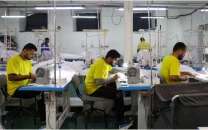Teens in US deceiving parents on Internet use: McAfee survey
Study reveals that as over 70 percent of teens have found ways to avoid parental monitoring.

In a statement, McAfee said nearly half of the American parents it surveyed thought their adolescents told them everything they did online, and that they felt in control when monitoring their youngsters' online conduct.
"However, the study reveals that teens deceiving their parents are on the rise, as over 70 percent of teens have found ways to avoid parental monitoring," it said.
That compares to 2010 when 45 percent of teens said they had hidden their online behavior from a parent, said McAfee, which bundles parental controls into its anti-virus software programs for home use.
Clearing the history of an Internet browser, or closing or minimizing a browser when a parent walked into the room, were the most popular ways of fooling mom and dad, McAfee said.
Others included hiding or deleting instant messages or videos, lying or omitting details about online activities, using a computer that parents don't check, and using an Internet-enabled mobile device such as a smartphone.
"This is a generation that is so comfortable with technology that they are surpassing their parents in understanding and getting away with behaviors that are putting their safety at risk," said McAfee online safety expert Stanley Holditch in the statement.
McAfee went online itself to interview 1,004 young people aged 13 to 17, and 1,013 parents of teenagers, in the United States between May 4 and May 29. The overall margin of error was 2.2 percentage points.
The survey also indicated that 43 percent of teenagers had accessed simulated violence online, 36 percent sexual topics online, and 32 percent nude content or pornography online, "despite their awareness of online dangers."
It also found that 15 percent of teens had hacked a social network account, 16 percent acknowledged looking up school test answers on their smartphones, and 20 percent ended friendships as a result of a social network account.



















COMMENTS
Comments are moderated and generally will be posted if they are on-topic and not abusive.
For more information, please see our Comments FAQ